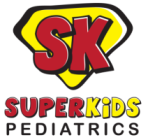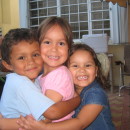Asthma
Asthma is a chronic disease of the breathing tubes that carry air to the lungs, in which the linings swell and fill up with mucus. This causes the tubes to get narrow and makes it difficult to breathe. As air moves through the narrowed airway, it can make a wheezing sound.
It is one of the most common chronic diseases in children, affecting between 5-10%.
Symptoms:
- Coughing
- Trouble breathing
- Shortness of breath
- Trouble with exercise
- Chest tightness
Symptoms can get worst with infections, weather changes, or exposure to an asthma trigger (things that can cause an asthma attack or make asthma worst). Common triggers are: viral infections, smoke, dust, mold, dust mites, cockroaches, pollen and animal dander.
What can we do?
Even though there isn’t a cure for asthma, there are medications that can help control it. Using them right is very important.
There are two kinds of medicines:
- Quick Relief (Rescue) medicines
- They work fast to open the airways and relieve symptoms. Work by relieving muscle spasm to allow better airflow in a temporary basis.
- They are called Bronchodilators.
- Most common bronchodilator is called Albuterol
- Control Medicines
- They are used every day, and prevent symptoms for happening by fighting the inflammation and keeping the airways open. They do NOT take away the symptoms at the moment of the attack.
- Your child should take it if: symptoms occur more than twice a week OR wakes up with asthma symptoms more than twice a month.
- Most common controller medications are inhaled steroids.
Children with Asthma are especially vulnerable to respiratory tract infections. All children should get a Flu Shot every year, but especially those with Asthma.
Lets Make you Child’s Asthma Action Plan!
We can help you write an Asthma Action Plan, which is a specialized Care Plan for children with asthma. This plan lists the medicines your child should take and how often, what to do if symptoms gets worse, and, when to get medical help right away. Give a copy to your child’s school or Day Care so they also know what to do. Talk to your child’s teachers, coaches, the school nurse and office staff. Call us at 561-619-2460 to start working on your child’s Asthma Action Plan which will be configure to your children specific condition.
Always call a Pediatrician if your child has trouble breathing, and, if your child coughs, wheezes, or has chest tightness more than once or twice a week. Your Pediatrician can help you create a Asthma Action Plan and Plan of Care!
Call emergency medical services/911 if:
- Severe breathing problems (struggling to breathe, pulling in at the neck or under the rib cage with every breath.
- Child is having difficulty walking or talking.
- Lips or fingernails are turning blue
- Symptoms are not improving after a second dose of quick relief medication.
by: Lizaida Medina Candelaria, MD FAAP
Dr. Medina is a Board Certified Pediatrician and an Active member of the American Academy of Pediatrics and the Palm Beach Pediatric Society. She is part of the Medical staff at Jupiter Medical Center and Palms West Hospital. Dr. Medina’s office is located in Palm Beach Gardens. Learn more about Dr. Medina!
SuperKids Pediatrics
9121 North Military Trail Ste 102
Palm Beach Gardens, FL 33410
Office Phone: 561-619-2460




